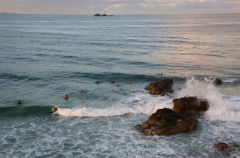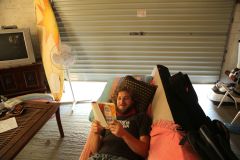Busy times, quiet times and escape to books
Pretty dull 3 weeks of washing the dishes, surf's up and Marco Polo, James Cook and other books. Breaking news about Genghis Khan and Caliph of Bagdad, fresh and hot, straight from the 12th century
3 weeks have passed since the year 2014 was switched on, but there’s not much to say, from my side.
No great victories to celebrate and share, no great losses to lament and share.
The most “exciting” was definitely the first week after 1.1.2014, when the high season in Byron Bay hit its highest, and I (and also Irene and Olga) was working like crazy. 100 hours of washing the dishes in 10 days! My hands almost fell off but I earned a fortune :-) Sort of.
After those 10 crazy days the season started to slow down and everything became less hectic, and finally downright boring, as my hours went down and down.
Other “noteworthy” news is that as the rainy season came along, the onshore winds that had been ruining the surfing before are finally gone, only with few unfortunate exceptions, and so the ocean is pumping almost every day beautiful waves, dying to be surfed. As my workload decreased and swell increased I’m out in the waves almost every day now. Too bad, that I bought the board that I bought. After noticing two key characteristics of my surf board – (1) I can paddle out through really big waves easily and (2) when I try to ride a wave that is not big, the board simply sinks right under me even if I manage to stand up in the right moment – my previous assumption turned into almost certainty. And this almost certainty turned into plain certainty after I finally googled “surf shapes” and I was confirmed that in my idiocy I had bought a “gun” type surf board, which is designed for big waves surfing. Amazing! I have a surfboard for 3m waves, but the biggest waves I can ride are less than 1,5m. Fortunately, after hours of frustration and fighting I finally began to tame my board and in combination with venturing out into bigger waves I managed to get few exciting rides. It’s still like trying to ride a poodle instead of a horse, but at least I’m having some fun. Too bad that the breaks are horribly crowded, and the surfers there are mostly complete assholes, so most of the time I spend watching everybody else taking wave after wave and dodging kamikazes. I came to opinion that surfers are probably the biggest assholes on the planet. Good old skiing! :-)
With my life becoming sort of boring, I needed an escape from the dull reality, and I turned to books for inspiration. Kahlil Jibran’s The Prophet, Marco Polo’s Travels, Sea of Dangers about James Cook’s “discovery” of Australia and New Zealand, Saltwater Buddha about Zen and surfing (sent to me few months ago by Samo via Lukas, thanks bro!), and last but not least Holy Bible - those were my companions during the last few weeks. Reading about travels of Marco Polo and James Cook, and about first contacts between westerners and Mongols, Maori and Aborigines, was actually probably more exciting than the traveling itself! God bless the books!
As I know that your life is boring as well (why otherwise would you spend time reading THIS blog) :-) , I would like to share with you at least some of the most interesting parts of these books:
Marco Polo’s Travels:
Paragraph on greediness:
So the Caliph [of Bagdad] was captured [by Mongolian invader Hulagu] together with the city. After his capture a tower was discovered, filled with gold. When Hulagu saw this he was amazed and ordered the Caliph to be brought before him. “Caliph,” said he, “why have you heaped up all his treasure? What did you mean to do with it? Did you not know that I was your enemy and was coming against you with all this host to despoil you? Knowing this, why did you not take your treasure and give it to knights and hired soldiers to defend you and your city?” The Caliph made no answer, because he did not know what to say. Then Hulagu said: “Caliph, since I see that you love your treasure so dearly, I will give you your own to eat.” Next he ordered that nothing should be given to him to eat or drink. “Now Caliph, eat your fill of treasure, since you are so fond of it; for you will get nothing else” After that he left him in the tower, where at the end of four days he died. So it would have been better indeed for the Caliph if he had given away his treasure to defend his land and his people rather than die with all his people and bereft of everything. And since then there has been no other Caliph.
----
Paragraph on an interesting profession:
Let me tell you next that when a man has died here [in land called Hormuz], or a woman, they make a great to-do about mourning. Gentlewomen mourn their dead fully four years after death, a least once a day. They assemble with their kinsfolk and neighbours and give themselves up to loud wailing and keening and lamenting the dead. Since deaths are frequent, they are never done with mourning. There are even women among them who specialize in lamentation and are daily on hire to bewail the lost ones of other men and women.
---
Paragraph on Buddhism: :-)
The wise men who do this [magic with weather] are called Tibetans and Kashmiris; these are two races of men who practice idolatry. They know more of diabolic arts and enchantments than any other men. They do what they do by the arts of Devil; but they make others believe that they do it by great holiness and by the work of God.
Eat this Dalai Lama! :-)
---
This I find extremely interesting. Based on our western history education we usually consider Genghis Khan as reincarnation of devil himself, as the most bloodthirsty and savage conqueror of all times. Here is what Marco Polo, the man who spent 26 years in the East, and whose first-hand knowledge of Mongolian empire and history is probably unsurpassed, has to say about Genghis Khan (it needs to be said, that Marco Polo did not meet Genghis Khan, only his offspring, asd Genghis Khan was dead by the time Marco Polo ventured to the east):
Now it happened in the year of Christ’s incarnation 1187 that Tartars chose a king to reign over them whose name in their language was Genghis Khan, a man of great ability and wisdom, a gifted orator and brilliant solider. After his election, all the Tartars in the world, disperse as they were among various foreign countries, came to him and acknowledged his sovereignty. And he exercised it well and honourably. What more shall I tell you? The number of Tartars who rallied round him was past belief. When Genghis Khan saw that a following he had, he equipped them with bows and their other customary weapons and embarked on a career of conquest. And I assure you that they conquered no less than eight provinces. He did not harm the inhabitants or despoil them of their goods, but led them along with him to conquer other nations. That is how he conquered the great multitude of nations of which you have heard. And those he had conquered, when they saw his good government and gracious bearing, asked nothing better than to join his following. Then, when he had amassed such a multitude of followers that they covered the face of the earth, he made up his mind to conquer a great part of world.
Well, that’s surely a different perspective on conquest and government of Genghis Khan, which succeeded to kill 17% of world’s population. Clearly, the history was, and is written by the winners. Though, the winners change throughout the history…
---
The Prophet:
This book is pretty famous, and I will not quote from the “words of the prophet”, Mustafa, in his lessons to citizens of Orphalese, for the whole book needs to be read, it makes no sense to cut out few phrases, but this little paragraph in the prologue caught my attention and resonated deeply within me:
But as he descended the hill [after he saw that a ship came to rescue him from his 12 years exile on Orphalese island], a sadness came upon him, and he thought in this heart:
How shall I go in peace and without sorrow? Nay, not without a wound in the spirit shall I leave this city. Long were the days of pain I have spent within its walls, and long were the nights of aloneness; and who can depart from his pain and his aloneness without regret?
---
Sea of Dangers
I cannot quote from the book about James Cook, because I read that book in public library and I don’t have it with me, but the most interesting part of the book, for me, was difference of attitude of Maori (indigenous population of New Zealand) and Aborigines (indigenous population of Australia) towards the white newcomers. Maori (whose cultural level reached approximately that of ancient Egypt by the time of Cook’s arrival, in some aspects, like navigation, much further of course) were eager to trade goods, they were interested in all novelties, finally stole huge amount of iron nails from Cook’s ship (as they understood their great value) and their women openly suggested and requested sex with the sailors, and some sailors were even “raped” (surely not too much against their will). Aborigines (whose cultural level reached only to stone age by the time of Cook’s arrival), avoided all contact with the foreigners, they didn’t trade or steal anything, they didn’t want anything. They carefully investigated nails which Cook gave them, and returned them. Their women were always hidden.
It’s interesting to see how Maori had pretty much same mindset as the westerners: let’s trade, steal, fuck, while Aborigines were closed within their own time and space, satisfied with what they had, not interested in changing their world at all.
The rest is history, and while Maori are well integrated in New Zealand’s culture and even the white population is proud about Maori history, Aborigines were swept and almost completely annihilated, refugees in their own land, in one of world’s most racist countries…


